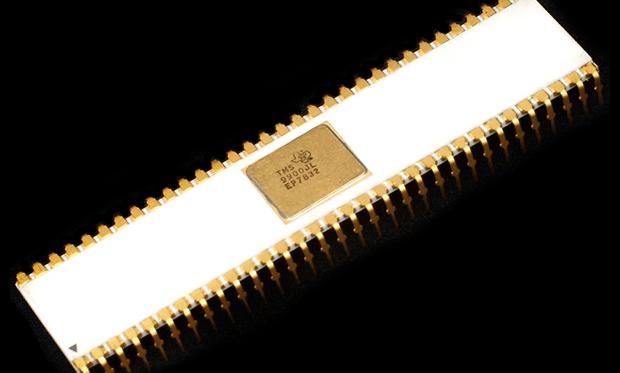The Great Races of Computing Dominance How TI, Motorola, and Zilog lost the Great Microprocessor race to Intel but went on to win the Great DSP race.
What are the Great Races?
(1) Handheld digital pocket calculator. Key competitors:
Sharp QT-8B, EL-8 with Rockwell chips,
Busicom Handy LE-120A with the world's first calculator-on-a-chip the Mostek's MK6010L
Busicom 141-PF with the world's first general purpose 4-bit microprocessor the Intel 4004 (1971).
Other noteworthy competitors: Casio, Canon (with TI), TI's TMS0106 calculator on a chip, HP the world's first scientific calculator HP-35 (with Mostek chips), and Pico.
See [4],[5],[6],[7]
(2) General purpose micro-computer/micro-processor [1]. IBM won it with the 5150 PC (1981). Intel won it with the 8088 chip in 1979 (16-bits inside, 8-bit port to connect with 8 bit peripherals, 20-bit logical address allowing 1MB memory access with segmented memory model). Microsoft won it with MS-DOS. Losers? TI's TMS9900, Motorola's 68000 (1979, but slower to produce production ready samples), Zilog Z8000 (1979)
(3) Digital signal processing chip. TI won it with the TMS320 series of DSP chips (1983), with the C5x line being the most popular. Also important: Intel 2920 (1978). Bell Labs DSP-1 for AT&Ts telephone equipment (1980). NEC was the first winner in the audio market with the PD7720. TMS32010 (1982) was the beginning of the ultimate winner in the market with 7 years of early loss leading work in DSP chips. TI now leads the $5B market of DSPs and the $10B market for FPGAs. (see [1],[3],[9]).
(4) Microcontrollers - complete embedded systems on a chip. TI won it (TMS1802, Gary Boone). and then the TMS 1000 (1974). Intel was a close competitor with the Intel 8048 (1977, which would power over a billion PC keyboards), and Intel 8051 (popular from launch to the early 2000s). In the 1990s came the hobbyist developments from Microchip PIC, Atmel/Arduino in the 1990s and 2000s. 55% of all CPUs in 2002 were 8-bit microcontrollers, in everything from toasters, to gas pumps, to keyboards, washing machines, telephones, microwave ovens, toys. (see [10],[11])
(5) Desktop graphics cards. Nvidia won.
(6) Cellphone graphics chips. Imagination Technologies (Kings Langley, UK) won.
(7) Home printers. Canon
(8) Photocopiers. Xerox.
(9) Cameras. Canon
(10) RISC chips. Winner: ARM, Atmel/AVR. (see [12])
References
[1] How Texas Instruments lost the microprocessor race to Intel.
https://spectrum.ieee.org/tech-history/heroic-failures/the-inside-story-of-texas-instruments-biggest-blunder-the-tms9900-microprocessor
[2] Intel 8086 (1978) was a 16-bit chip, which was rapidly downgraded to Intel 8088 (1979) to enable compatibility with the 8-bit peripheral chips and qualify for IBMs 5150 skunkworks project to launch a world-dominating micro-computer before Apple, Commodore, Radio Shack, or TI. See [1].
[3] DSP evolution over the past 30 years, Francois Charlot
https://www.slideshare.net/fcharlot/digital-signal-processor-evolution-over-the-last-30-years
[4] The Great Calculator Race: Busicom and the Intel 4004, amongst other competitors.
http://www.vintagecalculators.com/html/busicom_141-pf_and_intel_4004.html
[5] How the price of an electronic four-function handheld calculators went from $1,000 in 1966 to $100 in 1972 to $10 in the 1980s to $1 in 1990s -- dropping an order of magnitude in each decade.
[6] The Pocket Calculator Race,
http://www.vintagecalculators.com/html/the_pocket_calculator_race.html
[7] History of the Pocket Calculator
https://en.wikipedia.org/wiki/Calculator#Development_of_electronic_calculators
[8] Timeline in the development of Pocket Calculator
http://www.vintagecalculators.com/html/history_of_electronic_calculators.html
[9] History of the DSP
https://archive.eetasia.com/www.eetasia.com/ART_8800310261_499489_NT_a653224d.HTM
[10] Microcontroller History
https://en.wikipedia.org/wiki/Microcontroller#History
[11] How the Microcontroller was invented at Texas Instruments -- out of monotony from a booming electronics design service business.
http://www.circuitstoday.com/microcontroller-invention-history
[12] RISC chips
https://en.wikipedia.org/wiki/Reduced_instruction_set_computer
The Inside Story of Texas Instruments’ Biggest Blunder: The TMS9900 Microprocessor - IEEE Spectrum
